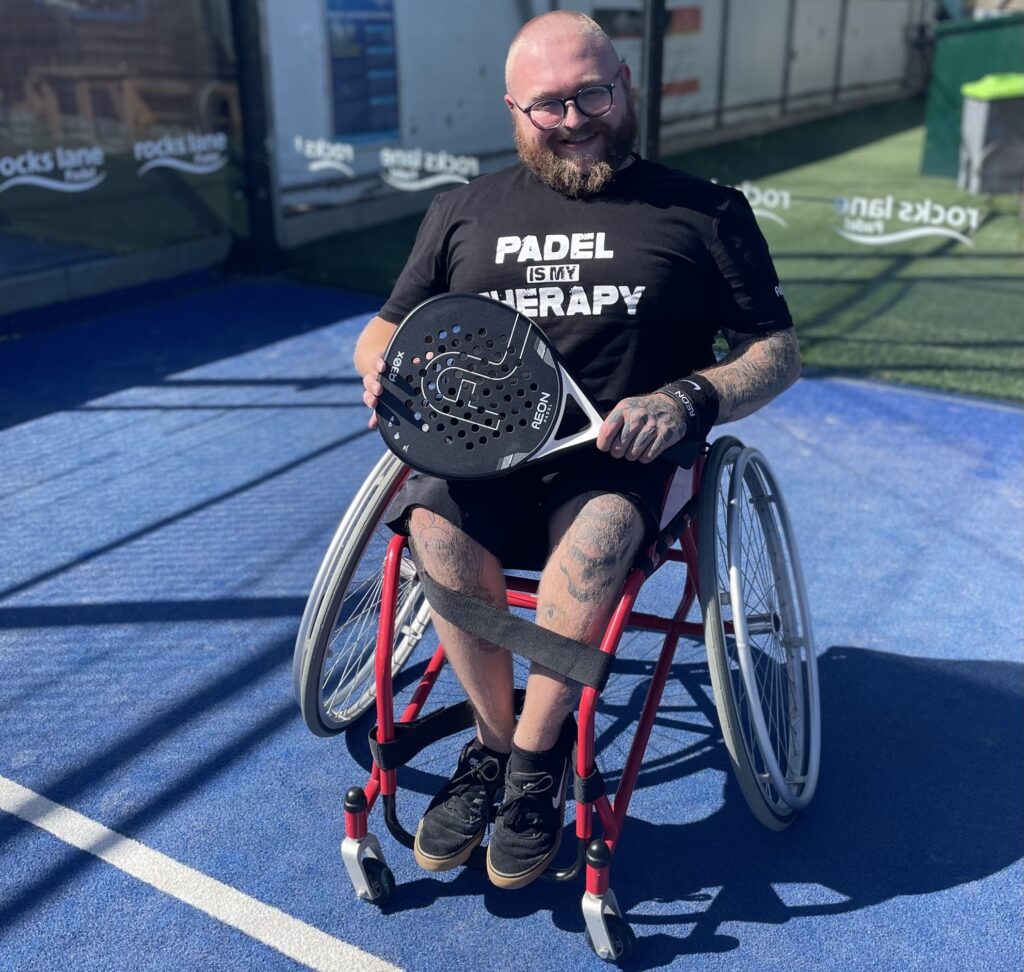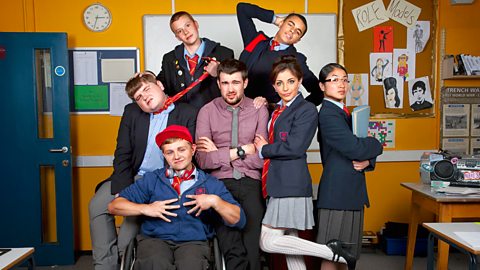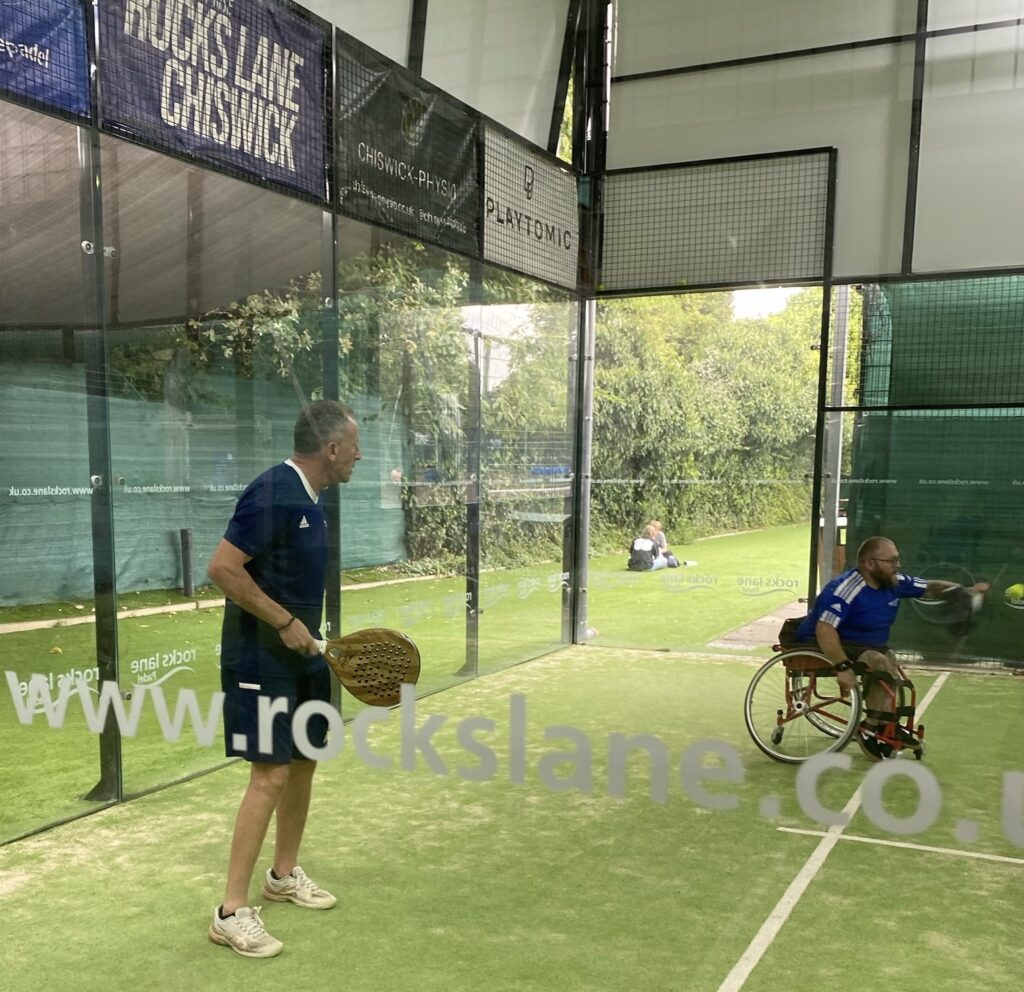Bad Education’s Rem Dogg (aka Jack Binstead’s) bid for GB adaptive padel squad
If you’ve played at Rocks Lane, Chiswick, in the last week or so and thought you spotted Rem Dogg (from Jack Whitehall’s BBC3 sitcom Bad Education) whacking a padel ball across court you weren’t seeing things.
For Rem Dogg actor Jack Binstead has discovered padel and is now intent on building a GB wheelchair (adaptive) padel squad to take on the world.
It’s been a whirlwind padel romance for the 26-year-old, who only picked up a racket within the last two weeks but, by his own admission, has become hooked and is packing in as many coaching sessions at the South West London padel club as possible.
But his ambitions to put GB on the international adaptive padel stage face two challenges – he needs to find other wheelchair padel players to practice and play with and source specialist wheelchairs for them to use.
“It’s currently looking like I might be the only wheelchair padel player in the country,” Jack told The Bandeja. “And we need to build an army of wheelchair players. I like to believe it is the beginning of the GB squad; we are in a position right now where we get to draft it ourselves, make it what we want,” he said. “I am hooked on the sport and I am liking getting back into fitness, that’s quite fun, but I also really like what could be, that I could be one of a team of people that could be the driving force behind the sport blowing up.”


Athlete
His enthusiasm is infectious but there’s also a steely will behind the self-proclaimed ‘rude boy actor’, honed as a seasoned athlete following years of wheelchair racing which saw him achieve a career-high national ranking of fifth. Memorably he won the London Junior Marathon aged 12 with a leg broken in two places (he suffers from brittle bone disease).
“I was Team GB for wheelchair racing, I had a seven year career as a wheelchair athlete, 100m up to marathon. I was young too, I was nine when I started and 16 when I retired. I had a really great career – I’m pretty sure there are course records I still hold. But I had always said if I had a redo button I’d have done tennis instead.
“I did wheelchair tennis for cardio and fun when racing but never played a match,” said Jack. “I’m finding padel more interesting than tennis. There is more to it, it is a faster paced game.”
wheelchair padel players don’t have to be in a wheelchair but they do need to have a physical disability.
So now he’s not only turning this determination to mastering padel and developing opportunities in the sport for people with disabilities – all with a view to finding others to play adaptive padel with and forming a fledgling GB squad – he’s hitting the reset button and following a dream (albeit in a different racket sport).
But it’s not all plain sailing for the left-hander. After more than two decades of building upper body strength for wheelchair racing he has a hard forehand: “One of my problems right now, so early on, is that I do hit it hard. It is a powerful shot.”
Player pathway
Rocks Lane has been keen to develop adaptive padel, holding an open session earlier this year to encourage new players on to court. It is now sponsoring Jack, providing the all-essential specialist sports wheelchair and assisting with coaching/equipment via its Padel Performance Player Pathway, as managing director Chris Warren explained: “We are delighted to welcome Jack on to our PPPP at Rocks Lane Padel. We believe that this is a first for padel in the UK. We will be supporting Jack all the way in his ambition to become a pro padel player, drawing on our experience at Bishops Park which led the way in adaptive tennis in the 1980s.”
Chris was part of the Community Tennis Programme team set up at Fulham’s Bishops Park in 1983 under the guidance of Adrian Rattenbury and Gordon Gibbons. The initiative, funded by the London Borough of Hammersmith and Fulham, aimed to break what were considered ‘significant’ barriers to entry into tennis. It included the first adaptive tennis programme and allowed children to play free at school and in local parks. The programme identified children who wanted to play tennis for fun and those that wanted to play competitively.
Sponsorship
The next step is to gain further sponsorship to fund specialist sports wheelchairs and the coaching required for players. Padel brand AEON has provided Jack with a racket and apparel.
Finding fellow players is proving a challenge but, as Jack and Rocks Lane’s Chris Dolphin pointed out, wheelchair padel players don’t necessarily have to be in a wheelchair but they do need to have a physical disability.
So until more players come forward, Jack intends to press on with coaching and raising awareness of adaptive padel. He’s also busy writing a TV psychological drama, runs his own media production company, has a podcast and has just launched his new Instagram account specifically for padel (jack_padel). 🎾
If you are interested in finding out more about wheelchair padel with Jack contact him through Instagram (jack_padel) or get in touch with us and we’ll pass on your details:
emma@thebandeja.com








